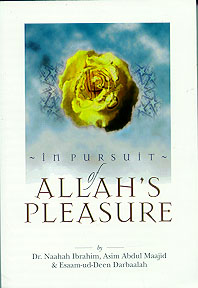In Pursuit Of Allah's Pleasure

Part Eight: Our 'Adaa' (Animosity)
Our 'Adaa' (animosity) is against adh-Dhalimoon (disbelievers, polytheists, wrong-doers)
Our animosity is against Adh-Dhalimoon, or those who practise Adh-Dhulm. Adh-Dhulm is of two types:
- Dhulm akbar, which is considered to be kufr or disbelief.
- Dhulm asghar,which is considered an act of disobedience committed by Muslim sinners.
As for the disbelievers, they receive from us no less than total hatred and enmity, which they reciprocate in turn,
"Hatred has already appeared from their mouths, but what their hearts conceal is far worse." [Surah Ale-Imran (3), Ayah 118.]
"And they will never cease fighting you until they turn you back from your religion if they can." [Surah Al-Baqarah (2), Ayah 217.]
"They intend to put out the Light of Allah (the religion of Islam) with their mouths." [Surah As-Saff (61), Ayah 8.]
"Never will the Jews and the Christians be pleased with you unless you follow their religion." [Surah Al-Baqarah (2), Ayah 120.]
"Let not the believers take the disbelievers as awliyyaa' (friends, supporters, helpers) instead of the believers." [Surah Ale-Imran (3), Ayah 28.]
"You will not find any people who believe in Allah and the Last Day, making friendship with those who oppose Allah and His Messenger, even though they were their fathers, their sons, their brothers or their kindred [people]." [Surah Al-Mujaadilah (58), Ayah 22.]
Commenting on this verse, Ibn Kathir said, "even though they were their fathers" refers to Abu `Ubaidah bin Al-Jarrah when he killed his father in the Battle of Badr."Or their sons" refers to Abu Bakr As-Siddique who almost killed his own son, `Abdur Rahman, on the same day. "Or their brothers" concerns Mus'ab bin `Umair who killed his brother, `Ubaid bin `Umair, again in the Battle of Badr. "Or their kindred [people]" refers to `Umar bin Al-Khattab who killed a relative of his on the same day. It also refers to Hamza and `Ali who killed `Utbah, Shaibah and Al- Waleed bin `Utbah, and Allah knows best.'
Islam sets out the position of the party of Allah as opposed to the party of Satan. It determines the position a Muslim should take against the disbelievers, namely hatred, animosity and roughness, and nothing else other than that. There should be no inclination towards the disbelievers, nor should there be any compromises with them,
"And incline not towards those who do wrong, lest the Fire should touch you." [Surah Hud (11), Ayah 113.]
"They wish that you should compromise [in religion out of courtesy] with them, so they [too] would compromise with you." [Surah Al-Qalam (68), Ayah 9.]
Islam considers both inclination towards the disbelievers and making compromises with them forbidden acts. Al-Walaa' or loyalty takes two forms: expressed and hidden. Hidden loyalty to the disbelievers (that is with the heart) is deemed kufr akbar, or major disbelief which definitely takes one out of the fold of Islam, whether or not one expresses it openly. As for the open and expressed loyalty to the disbelievers, this could either be an act of kufr or a major or minor act of disobedience in accordance with the judgement of Shari'ah in each individual case.
Al-Qurtubee said, "He who frequently sees the secrets of the Muslims and draws them to the attention of the enemy by informing about them, is not regarded as a kafir if his action is intended for worldly gains. This is exactly what happened to Hatib bin Abee Balta'ah who did so in order to obtain support without the intention of becoming an apostate." The incident which Al-Qurtubee mentioned provides ample evidence that hatred and animosity against the disbelievers is the right attitude we must hold towards them.
"We have rejected you, and there has started between us and you, hostility and hatred forever until you believe in Allah alone." [Surah Al- Mumtahinah (60), Ayah 4.]
But how about the Muslims who commits a lesser act of Dhulm, such as the oppressive and the heretic Muslim? Should we love them because of their Islam or hate them for their sins? Should we extend our protection and loyalty to them, or express animosity?
Ibn Taymeeyah said, "Allah has sent the Messenger and revealed the Book, so that all the religion becomes wholly for Allah alone. Therefore, love should be for Him and His obedient servants, and hatred for His enemies. The honour to His loyal servants and humiliation and degradation to His enemies. The reward for the faithful and all the punishment for His enemies. If, however, a man possesses both the attributes of good and evil; of decency and vileness; of obedience and rebellion; of Sunnah and bid'ah; he deserves protection and reward commensurate with what good there is in him, and merits, animosity and punishment in accordance with the evil he harbours. This is the principle upon which the followers of Ahl-us-Sunnah wal- Jama'ah agree. Only the Khawaarij and Mu'tazalah sects and their followers oppose this opinion. These [misguided] sects categorise people as those who deserve only reward or punishment, but not both."
